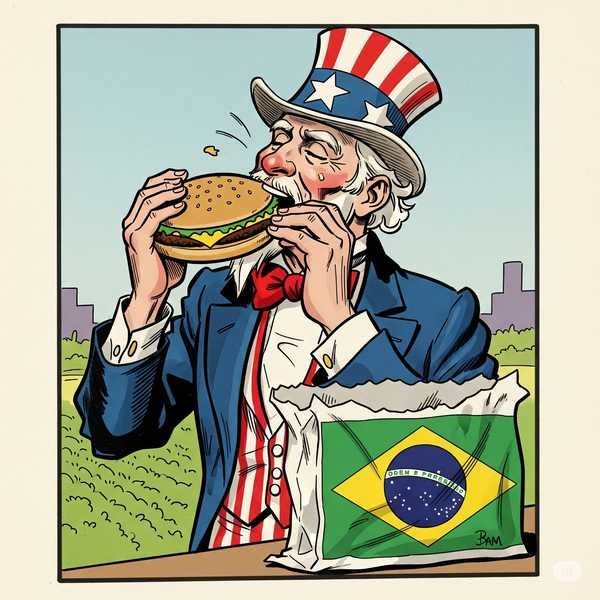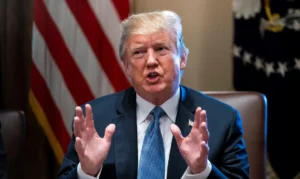
Trump’s Strategic Blunder.
Donald Trump announced 50% tariffs on Brazilian products, a measure that promises to affect three absolutely strategic products for American food security: coffee, orange juice, and hamburger meat. While we have already addressed the coffee issue in previous analyses and will soon return to it, and orange juice will be the subject of a specific article, this text focuses on hamburger meat—the frozen boneless beef that Brazil supplies on a large scale to the United States. The measure reveals a fundamental contradiction that borders on the pathetic in its counterproductive effects.
Hamburger in American Culture
The United States is the world’s largest consumer of hamburgers. Americans consume about 50 billion hamburgers per year, which equates to approximately three hamburgers per week for every inhabitant. More than just a food, the hamburger is deeply rooted in American culture and diet, representing a symbol of the country’s practicality and lifestyle. This national preference is not just cultural—it’s also economic. The hamburger represents an accessible source of protein for millions of American families, especially at a time when food prices have been straining household budgets.
External Dependence
The fundamental raw material for hamburger production is frozen boneless beef. The United States imports millions of tons of this product annually, representing a significant portion of domestic consumption.
The numbers reveal Brazil’s strategic importance to the American market. The country has consolidated its position as the main supplier of frozen boneless beef to the United States, reaching 34.7% of American imports in April 2025. This share has grown consistently, starting from levels around 13% in early 2024 and reaching over 30% in several recent months. To put it in perspective, other traditional suppliers such as Argentina, Canada, and Mexico have much smaller shares in the American market. Brazil has established itself as the main external supplier of this essential raw material, surpassing historical competitors and securing a leadership position in the segment.
Decline in American Production
The increasing reliance on imports reflects structural problems in American cattle ranching. Domestic beef production has faced a decline, with the American cattle herd reaching its lowest level since 1961. Factors such as prolonged droughts, rising feed costs, and environmental pressures have contributed to this reduction. The result is a historical transformation: the United States, which was traditionally a net exporter of beef, has become a net importer. This structural shift makes the country even more dependent on reliable external suppliers like Brazil.
Price Pressure and the Big Mac Index
The inflationary pressure on American food can be measured through the price of the Big Mac. Between 2005 and 2024, McDonald’s most famous sandwich jumped from US2.58toUS5.69, an increase of 120% in less than two decades.
This growth reflects not only general inflation but specifically the rising cost of beef in the United States. Brazil, by providing competitive meat, has helped stabilize raw material prices, contributing to curb an even greater escalation in American hamburger costs.
The Pathetic Outcome for Americans
The irony of the situation becomes evident when we analyze the practical effects of the tariff. For Brazil, losing a market that absorbs only 8.8% of its frozen boneless beef exports does not represent a major problem. Brazilian producers can easily redirect this production to other international markets or even to the domestic market. In Brazil, where meat prices have been straining family budgets, there is a clear opportunity: promotional campaigns and policies to encourage domestic consumption could easily absorb the production that would no longer go to the United States. The country has flexibility and alternatives, and Brazilians will be able to eat more meat at lower prices.
Trump’s Contradiction
From the American side, the scenario is completely different. Trump was elected with the central promise of reducing the cost of living for Americans, but his 50% tariff on Brazilian beef will produce exactly the opposite effect. The price of hamburgers—a staple food in the American diet—will increase directly. The irony deepens when we consider that Trump’s tariffs are highly unpopular in the United States itself: polls show that over 60% of Americans oppose this policy. And it’s not hard to understand why: the tariff acts as a tax on the poor, as lower-income Americans—whose income is more significantly impacted by food consumption—will be the primary ones taxed. It’s not Brazilians who will pay the additional 50%, but rather the most vulnerable American consumers.
Meanwhile, Trump intensifies his attacks on Brazilian sovereignty, going to the absurd length of blackmailing Brazil by demanding the end of the case against Bolsonaro as a condition to cancel the 50% tariffs. This is an impossible request, as neither Lula nor the National Congress has power over the Judiciary, which is an independent branch. These attacks on Brazilian sovereignty only strengthen Lula’s position, whose approval is already growing and tends to increase even further given his respectful stance in defense of national independence. The final outcome is pathetic: a measure intended to protect Americans ends up directly harming their plates and pockets, while Trump loses popularity and Brazil finds new markets. The United States will be left with more expensive hamburgers and greater dependence on alternative, potentially less competitive, suppliers, while Brazilians benefit from more available meat in the domestic market at lower prices.








